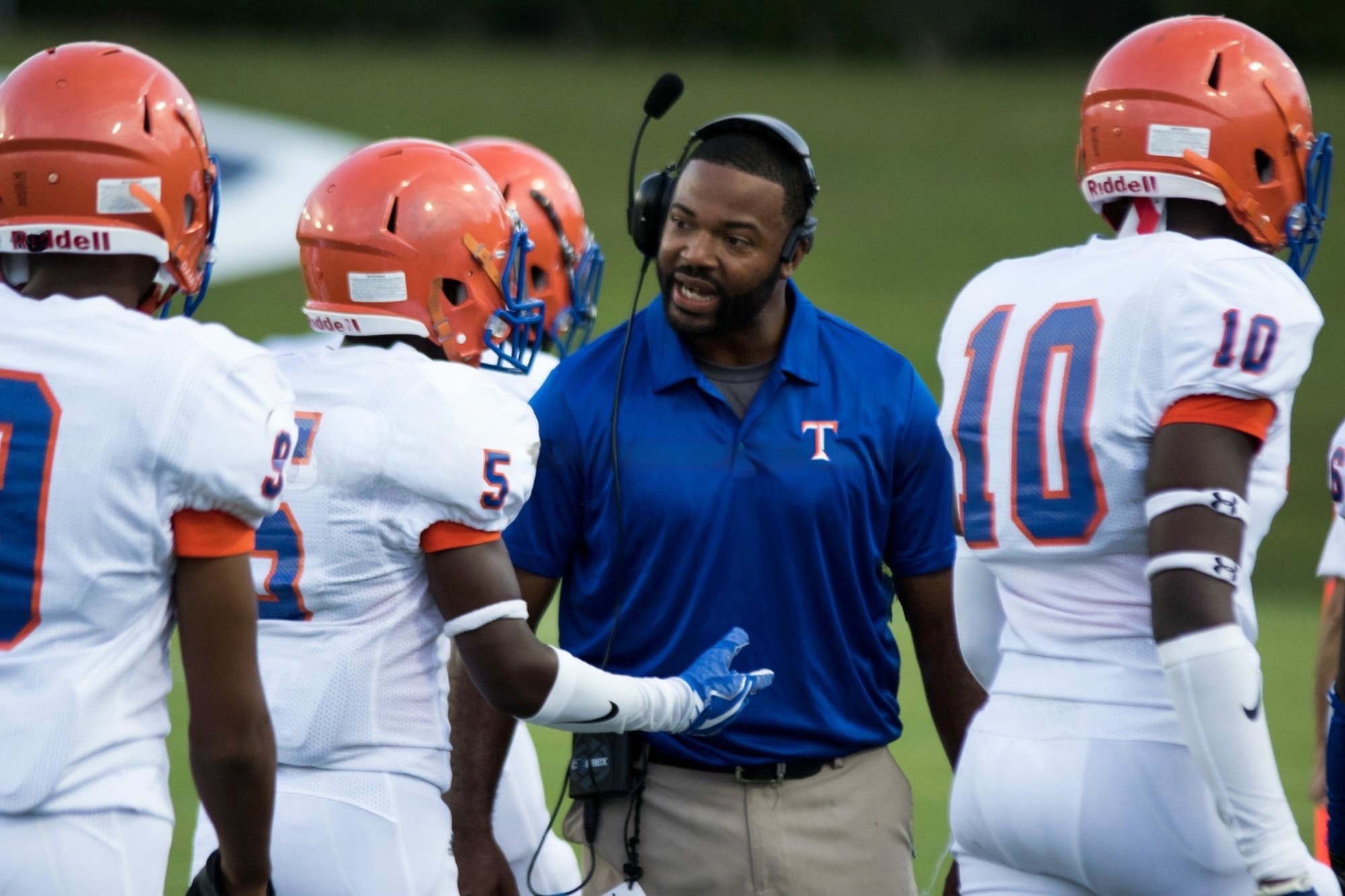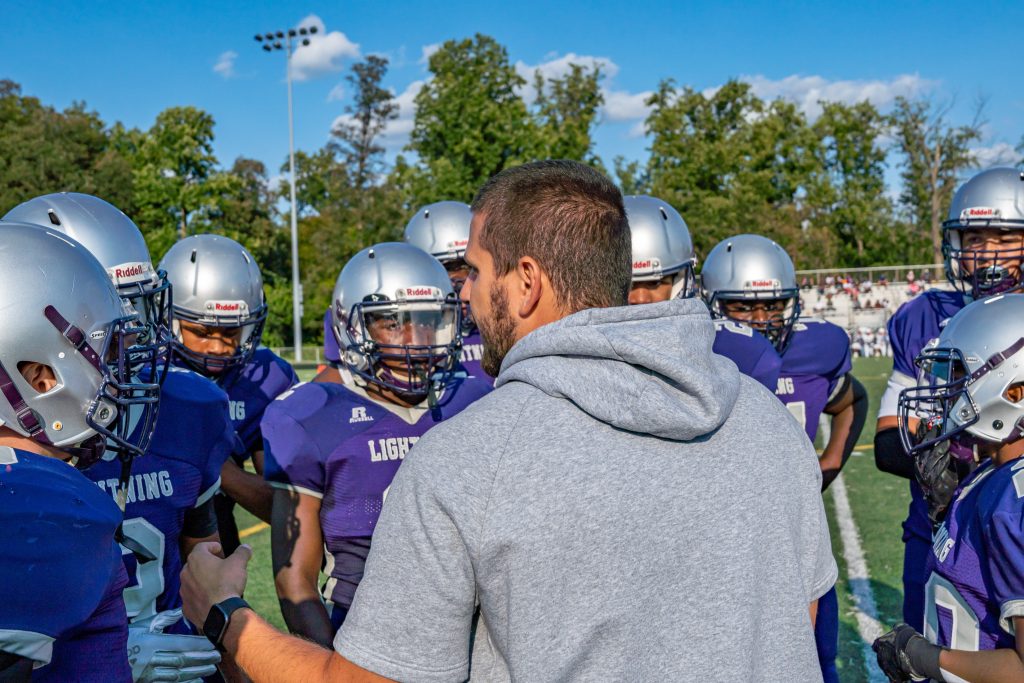High school football coaching jobs are vital to the sport. Coaches shape young athletes and guide them to success.
Coaching high school football goes beyond teaching plays. It involves mentoring, leadership, and fostering a sense of community. Coaches instill discipline and teamwork, helping students grow both on and off the field. These jobs are rewarding but come with challenges.
Coaches must balance winning games with developing players’ skills and character. They need strong communication and motivation skills. High school football coaching jobs offer a chance to make a lasting impact on young lives. Whether you’re a seasoned coach or just starting, this role can be fulfilling and inspiring. Ready to explore what it takes? Let’s dive in and discover the world of high school football coaching.
Introduction To High School Football Coaching
High school football coaching is a rewarding career path. Coaches have the chance to shape young athletes’ lives, both on and off the field. This role requires dedication, leadership, and a passion for the sport.
Role And Responsibilities
High school football coaches have many duties. They plan practices, develop game strategies, and motivate players. Coaches must also ensure player safety and follow school policies.
Coaches often work with assistant coaches and other staff. They collaborate to improve team performance. Recruiting new players and managing team equipment are also part of their job.
Importance In Student Development
Coaches play a crucial role in student development. They teach discipline, teamwork, and perseverance. These skills help students in academics and future careers.
High school football can boost students’ confidence. Playing sports helps them stay active and healthy. Coaches also serve as role models and mentors, guiding students in making positive life choices.
Qualifications And Skills Required
High school football coaching jobs demand a unique blend of qualifications and skills. Aspiring coaches need more than just a passion for the game. They must possess specific educational backgrounds and key coaching skills to excel in their roles. Understanding these requirements helps in becoming a successful high school football coach.
Educational Background
A high school football coach typically needs a bachelor’s degree. Degrees in physical education, sports science, or a related field are preferred. Some schools may require a teaching credential. This is because many coaches also work as teachers. Having knowledge of child development and psychology is beneficial. This helps in understanding and motivating young athletes.
Key Coaching Skills
Leadership is a crucial skill for high school football coaches. They must inspire and guide their team. Good communication skills are essential. Coaches need to convey strategies clearly and motivate players. Organizational skills are vital too. Coaches plan practices, manage schedules, and handle equipment. Problem-solving abilities are important. Coaches must make quick decisions during games. Patience and empathy are also key. These help in dealing with diverse personalities and skill levels.
Pathways To Becoming A High School Football Coach
High school football coaching jobs require dedication and passion. Building experience through assistant coaching roles and relevant certifications is essential. Networking within the local sports community also helps secure opportunities.
Becoming a high school football coach can be a rewarding career. It involves guiding young athletes and developing their skills. There are several pathways to achieving this goal. This post will explore some of these pathways.
Starting As An Assistant Coach
Many coaches begin their careers as assistant coaches. This role offers valuable experience. You work closely with the head coach and learn about team management. It is a great way to understand the dynamics of coaching. You also build relationships with players and other coaches. Being an assistant coach helps you learn the game strategies. It also gives you a feel of the high school sports environment. This experience is essential for moving up in your coaching career.
Certification And Training Programs
Certifications are important for high school football coaches. Many schools require specific coaching certifications. These programs teach essential skills. They cover topics like safety, first aid, and game rules. Attending training programs can boost your credentials. These programs often include workshops and online courses. They focus on improving your coaching techniques. Completing these programs shows your commitment to coaching. Training and certification programs keep you updated with the latest coaching methods. They ensure you are well-prepared for the challenges of coaching high school football.

Credit: www.jobmonkey.com
Building A Winning Team
Building a winning team in high school football takes dedication and strategy. Coaches must focus on assembling talented players and honing their skills. Each step is crucial for success on the field. From recruitment to skill development, every detail matters.
Recruitment Strategies
Recruiting the right players sets the foundation for a strong team. Coaches should scout local talent and attend youth games. High school football relies on finding athletes with potential. Holding tryouts helps identify those who can contribute to the team’s success. Effective communication with parents and players ensures everyone understands the goals.
Developing Player Skills
Once a team is formed, developing player skills is next. Coaches should create practice schedules that cover all areas. Focus on basic techniques first. Drills that improve speed, agility, and strength are essential. Players must also learn teamwork and strategy. Watching game footage helps identify areas for improvement. Regular feedback keeps players motivated and on track.
Creating Effective Game Plans
Crafting effective game plans is essential for high school football coaching jobs. Coaches need to strategize well to ensure team success.
Creating effective game plans is vital for high school football coaching jobs. Coaches develop strategies to outsmart opponents and win games. This process involves detailed analysis and careful planning.
Analyzing Opponents
Understanding your opponents is key. Coaches watch game tapes to study rival teams. They look for patterns in their plays. Coaches identify strong players and weak spots. This information helps in creating a tailored game plan.
Strategizing For Success
After analyzing opponents, coaches devise strategies. They design plays that exploit the opponent’s weaknesses. They also plan defenses to counter the rival’s strengths. Coaches ensure each player knows their role. Clear communication and practice make these strategies effective.

Credit: thesoutherneronline.com
Balancing Academics And Athletics
Balancing academics and athletics is crucial for high school football coaches. Ensuring student-athletes succeed in both areas helps build strong, well-rounded individuals.
Balancing academics and athletics can be challenging for high school football coaches. Students need to excel on the field and in the classroom. This balance is vital for their overall development. Coaches play a crucial role in guiding student-athletes. They must ensure both aspects are given equal importance.
Supporting Student Athletes
High school football coaches must support their players in various ways. They need to understand each player’s academic strengths and weaknesses. Regular check-ins with teachers help monitor academic progress. Coaches can also arrange study sessions before or after practice. Encouraging teamwork in studies builds camaraderie. Strong communication with parents is essential. Keep them informed about their child’s progress. This ensures a united effort in supporting the student-athlete. Providing resources like tutors or study guides can make a difference. Coaches should always emphasize the importance of balancing sports and studies.
Promoting Academic Success
Promoting academic success starts with setting clear expectations. Make it known that academics come first. Reward academic achievements as much as athletic ones. Recognize and celebrate good grades. Encourage time management skills. Teach players to prioritize tasks and manage their time well. Provide them with tools and strategies to stay organized. This can be a planner or a digital calendar. Offer guidance on how to handle stress. Balancing academics and athletics can be stressful. Teach relaxation techniques and the importance of breaks. A well-rested mind performs better in both areas. Lastly, be a role model. Show that you value education. Your attitude towards academics will influence your players. Lead by example and they will follow.
Career Advancement Opportunities
High school football coaching jobs offer many career advancement opportunities. Coaches can grow their skills and move up the career ladder. They can find paths to higher positions and greater responsibilities. These opportunities can lead to fulfilling and rewarding careers.
Moving To College Coaching
Many high school football coaches dream of moving to college coaching. This transition is a significant step in a coaching career. College coaching offers new challenges and higher competition levels. High school coaches can gain valuable experience in this environment. They can develop their strategies and learn from seasoned professionals. Success in high school coaching can open doors to college opportunities.
Networking And Professional Development
Networking is vital for career advancement in football coaching. Building connections with other coaches, athletic directors, and sports professionals can lead to new job opportunities. Attending coaching clinics, workshops, and conferences can help. These events provide chances to learn new techniques and strategies. They also allow coaches to meet and learn from experts in the field.
Professional development is also important. Coaches should stay updated on the latest trends and advancements in football coaching. This can include taking courses, reading coaching literature, and watching educational videos. Continuous learning and improvement can help coaches stand out in their careers.

Credit: indeedsports.com
Challenges Faced By High School Coaches
High school football coaching is a challenging yet rewarding job. Coaches face numerous obstacles daily. These challenges test their skills, patience, and dedication. Understanding these hurdles can help us appreciate their hard work. Let’s explore some key challenges faced by high school coaches.
Dealing With Pressure
High school coaches deal with immense pressure. Winning games is crucial. The community, parents, and school administration have high expectations. They want their team to succeed. Coaches must balance these expectations with the reality of their team’s abilities. This pressure can be overwhelming at times.
Coaches must also handle the pressure of developing young athletes. They need to foster both skills and character. This dual role adds another layer of responsibility. Keeping calm under pressure is a must. It ensures they can lead effectively and make the right decisions during games.
Managing Team Dynamics
Team dynamics play a vital role in a football team’s success. Coaches must manage diverse personalities. Each player comes with their own strengths and weaknesses. Building a cohesive team is a challenge. It requires patience, empathy, and strong communication skills.
Conflicts can arise among players. Coaches must resolve these issues quickly. They need to maintain a positive environment. A united team performs better on the field. Coaches must also ensure fair playtime. They need to balance the needs of the team with the individual goals of each player.
Effective team management helps build trust. It fosters a sense of belonging among players. This trust is crucial for a team’s success. It helps players work together towards a common goal.
Success Stories And Inspirations
High school football coaching jobs offer unique challenges and rewards. Many coaches have inspiring stories. These stories showcase their journey, hard work, and dedication. They help us understand what it takes to succeed. Let’s explore some of these success stories.
Profiles Of Successful Coaches
Many high school football coaches have achieved great success. Their profiles are full of valuable lessons.
| Coach Name | Team | Achievements |
|---|---|---|
| John Smith | Riverdale High | 3 State Championships |
| Emily Johnson | Hillside Academy | 2 Regional Titles |
John Smith, the coach of Riverdale High, led his team to three state championships. His dedication and strategies are well-known. Emily Johnson from Hillside Academy won two regional titles. Her coaching style focuses on teamwork and discipline.
Lessons From The Field
There are many lessons from the field that inspire future coaches. These lessons come from real experiences and challenges.
- Teamwork: Successful teams work together. Coaches build strong bonds among players.
- Discipline: Discipline is key. Coaches set rules and expect players to follow them.
- Adaptability: Flexibility in strategies helps. Coaches adjust to different situations.
Coaches like John and Emily teach us these lessons. They show that with hard work and dedication, success is possible.
Frequently Asked Questions
What Qualifications Are Needed For High School Football Coaching Jobs?
To coach high school football, you typically need a coaching certification. Experience playing or coaching football is also beneficial. Some schools may require a teaching credential.
How To Find High School Football Coaching Jobs?
You can find coaching jobs on school district websites, job boards, and sports associations. Networking with current coaches also helps.
What Is The Average Salary For High School Football Coaches?
The average salary for high school football coaches varies by location. Typically, it ranges from $3,000 to $8,000 per season.
What Are The Key Responsibilities Of A High School Football Coach?
A high school football coach plans practices, develops game strategies, and mentors players. They also ensure safety and compliance with rules.
Conclusion
High school football coaching jobs offer rewarding and impactful careers. Coaches shape young athletes, teaching skills and teamwork. These roles require dedication, passion, and leadership. Many schools seek qualified coaches, creating numerous job opportunities. Pursuing a coaching career can change lives, both for the coach and the players.
Stay committed, and you can inspire the next generation of football stars. If you love football and mentoring youth, this path might be perfect for you. Explore high school football coaching jobs and make a difference today.




